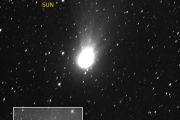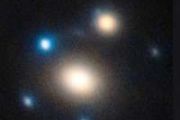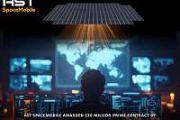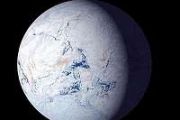
Copernical Team
Satellite Vu and SSTL commission satellite clone to double climate data collection
 Satellite Vu, the UK satellite firm set to become the world's global thermometer from space, has commissioned a new clone of its original satellite in collaboration with Surrey Satellite Technology Ltd. (SSTL) to double its data collection capacity.
The deal sees SSTL begin construction on the second of Satellite Vu's Mid Wave Infra-Red (MWIR) thermal imaging satellite's which will collect
Satellite Vu, the UK satellite firm set to become the world's global thermometer from space, has commissioned a new clone of its original satellite in collaboration with Surrey Satellite Technology Ltd. (SSTL) to double its data collection capacity.
The deal sees SSTL begin construction on the second of Satellite Vu's Mid Wave Infra-Red (MWIR) thermal imaging satellite's which will collect Heatwaves and fires scorch Europe, Africa, and Asia
 In June and July 2022, heatwaves struck Europe, North Africa, the Middle East, and Asia, as temperatures climbed above 40 degrees Celsius (104 degrees Fahrenheit) in places and broke many long-standing records.
The map above shows the surface air temperatures across most of the Eastern Hemisphere on July 13, 2022. It was produced by combining observations with a version of the Goddard Eart
In June and July 2022, heatwaves struck Europe, North Africa, the Middle East, and Asia, as temperatures climbed above 40 degrees Celsius (104 degrees Fahrenheit) in places and broke many long-standing records.
The map above shows the surface air temperatures across most of the Eastern Hemisphere on July 13, 2022. It was produced by combining observations with a version of the Goddard Eart How does reduced gravity affect astronauts' muscles and nerve responses
 Among the many functions performed by skeletal muscles, an important one is maintaining our posture. If it weren't for these muscles, Earth's gravitational pull may make it difficult for us to stand and walk around. The group of muscles-mostly present in our limbs, back, and neck-which are responsible for maintaining our posture and allowing us to move against the force of gravity are rightly ca
Among the many functions performed by skeletal muscles, an important one is maintaining our posture. If it weren't for these muscles, Earth's gravitational pull may make it difficult for us to stand and walk around. The group of muscles-mostly present in our limbs, back, and neck-which are responsible for maintaining our posture and allowing us to move against the force of gravity are rightly ca Terran Orbital Commissions Fleet Space CENTAURI-5 Payload
 Terran Orbital Corporation (NYSE: LLAP), a global leader in satellite solutions, primarily serving the United States and Allied aerospace and defense industries, has announced the commissioning of the Fleet Space CENTAURI-5 payload. The payload provides Machine to Machine (M2M) and Internet of Things (IoT) connectivity to ground terminals and is an improved version of the payloads flown on CENTA
Terran Orbital Corporation (NYSE: LLAP), a global leader in satellite solutions, primarily serving the United States and Allied aerospace and defense industries, has announced the commissioning of the Fleet Space CENTAURI-5 payload. The payload provides Machine to Machine (M2M) and Internet of Things (IoT) connectivity to ground terminals and is an improved version of the payloads flown on CENTA Novel way to 'see' the first stars through the fog of the early Universe
 A team of astronomers has developed a method that will allow them to 'see' through the fog of the early Universe and detect light from the first stars and galaxies.
The researchers, led by the University of Cambridge, have developed a methodology that will allow them to observe and study the first stars through the clouds of hydrogen that filled the Universe about 378,000 years after the B
A team of astronomers has developed a method that will allow them to 'see' through the fog of the early Universe and detect light from the first stars and galaxies.
The researchers, led by the University of Cambridge, have developed a methodology that will allow them to observe and study the first stars through the clouds of hydrogen that filled the Universe about 378,000 years after the B Johns Hopkins APL assembles first global map of lunar hydrogen
 Using data collected over two decades ago, scientists from the Johns Hopkins Applied Physics Laboratory (APL) in Laurel, Maryland, have compiled the first complete map of hydrogen abundances on the Moon's surface. The map identifies two types of lunar materials containing enhanced hydrogen and corroborates previous ideas about lunar hydrogen and water, including findings that water likely played
Using data collected over two decades ago, scientists from the Johns Hopkins Applied Physics Laboratory (APL) in Laurel, Maryland, have compiled the first complete map of hydrogen abundances on the Moon's surface. The map identifies two types of lunar materials containing enhanced hydrogen and corroborates previous ideas about lunar hydrogen and water, including findings that water likely played Laser marking on Mars
 If your name begins with "L" you will like this post about the first letter to be laser engraved on Mars. Every once in a while, we see cartoons in which a Mars rover is driven in a pattern to make letters in the sand with its wheel tracks. The letters spell out a silly phrase, and the cartoon usually has aliens on the side, laughing or puzzling over the meaning. The use of lasers on board Mars
If your name begins with "L" you will like this post about the first letter to be laser engraved on Mars. Every once in a while, we see cartoons in which a Mars rover is driven in a pattern to make letters in the sand with its wheel tracks. The letters spell out a silly phrase, and the cartoon usually has aliens on the side, laughing or puzzling over the meaning. The use of lasers on board Mars Why Jupiter doesn't have rings like Saturn
 Because it's bigger, Jupiter ought to have larger, more spectacular rings than Saturn has. But new UC Riverside research shows Jupiter's massive moons prevent that vision from lighting up the night sky.
"It's long bothered me why Jupiter doesn't have even more amazing rings that would put Saturn's to shame," said UCR astrophysicist Stephen Kane, who led the research.
"If Jupiter did
Because it's bigger, Jupiter ought to have larger, more spectacular rings than Saturn has. But new UC Riverside research shows Jupiter's massive moons prevent that vision from lighting up the night sky.
"It's long bothered me why Jupiter doesn't have even more amazing rings that would put Saturn's to shame," said UCR astrophysicist Stephen Kane, who led the research.
"If Jupiter did NASA selects Draper to for Lunar Far Side mission
 NASA has awarded Draper of Cambridge, Massachusetts a contract to deliver Artemis science investigations to the Moon in 2025. The commercial delivery is part of NASA's Commercial Lunar Payload Services (CLPS) initiative under Artemis.
Draper will receive $73 million for the contract, and is responsible for end-to-end delivery services, including payload integration, delivery from Earth to
NASA has awarded Draper of Cambridge, Massachusetts a contract to deliver Artemis science investigations to the Moon in 2025. The commercial delivery is part of NASA's Commercial Lunar Payload Services (CLPS) initiative under Artemis.
Draper will receive $73 million for the contract, and is responsible for end-to-end delivery services, including payload integration, delivery from Earth to New method increases lunar mapping accuracy to unprecedented levels
 TOPOGRAPHY: The surface of the moon and rocky planets, Mars in particular, are of huge interest to anyone trying to explore our solar system. The surface must be known in as much detail as possible, for missions to land safely, or for any robotic vessel to drive across the surface. But until now, the methods to analyze images from e.g. orbiting spacecraft have entailed a huge work load and immen
TOPOGRAPHY: The surface of the moon and rocky planets, Mars in particular, are of huge interest to anyone trying to explore our solar system. The surface must be known in as much detail as possible, for missions to land safely, or for any robotic vessel to drive across the surface. But until now, the methods to analyze images from e.g. orbiting spacecraft have entailed a huge work load and immen 





























